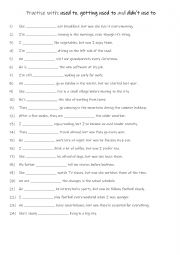
|
A2+-B1 Practise with used to, getting used to and didn�t use to
Students should learn used to, getting used to, and didn�t use to because these expressions are essential for describing past habits, changes, and adaptations. Used to highlights actions or states that were regular in the past but no longer occur, while getting used to focuses on the process of adjusting to new situations. Additionally, didn�t ...
Level: intermediate
Age: 9-100
Type:
Downloads: 131
|
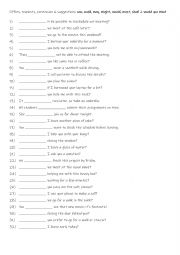
|
B1 Offers, requests, permission & suggestions - can, could, may, might, would, must, shall & would you mind
First, students familiarise themselves with the 8 modal verbs and their usage. Then they read the sentences to see which modal verb is needed to complete the sentence. Each modal is used 4 times. Answers on page 2.
Level: intermediate
Age: 8-100
Type:
Downloads: 105
|
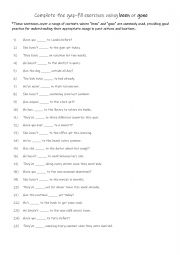
|
Been or gone?
Complete with either been or gone practise These sentences & questions cover various contexts where been and gone are used, providing needed practise for students to differentiate between the two.They cover a range of contexts where "been" and "gone" are commonly used, providing good practice for understanding their appropriate usage in past action...
Level: elementary
Age: 10-100
Type: worksheet
Downloads: 125
|
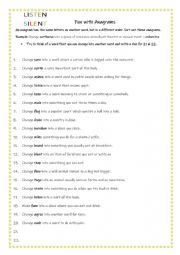
|
Anagrams
This worksheet is suitable for A2 students.The idea being for students to read each sentence and understand the description and recognise the spelling of that word.
Level: elementary
Age: 8-14
Type:
Downloads: 449
|
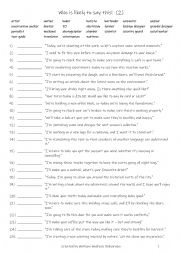
|
A2-B1 Who is likely to say this! (2)
Learning vocabulary for professions like journalist, mechanic. photographer and plumber is valuable because it helps people identify roles, understand career-specific responsibilities, and communicate effectively in different situations. Recognising job titles and what each profession involves supports clearer communication in daily life and improv...
Level: intermediate
Age: 8-100
Type:
Downloads: 118
|
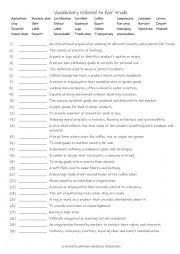
|
B1-B2 Vocabulary related to fair trade
First, students need to familiarise themselves with the 25 words and their meanings Then they read the definitions to see which one is being described and write that word in the space provided. Answers on page 2.
Level: intermediate
Age: 12-100
Type:
Downloads: 118
|
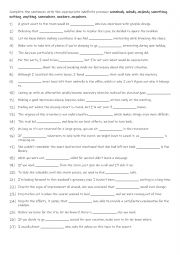
|
B1-B2 9 Indefinite pronouns
Each of the 9 indefinite pronouns is used 3 times. Students read the sentences and complete the gap-fill with the appropriate indefinite pronoun. Answers on page 2.
Level: intermediate
Age: 10-100
Type:
Downloads: 117
|
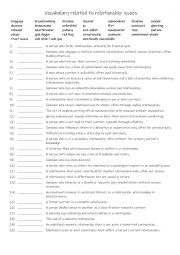
|
B1+-C1 Vocabulary related to relationship issues
Learning vocabulary related to relationship issues enhances communication and awareness of unhealthy patterns, enabling individuals to make informed decisions. Familiarity with terms like "ghosting" and "narcissist" promotes self-reflection, helping people understand their own behaviours and relationship styles. It empowers individuals to set bound...
Level: intermediate
Age: 9-100
Type:
Downloads: 108
|
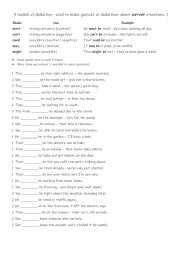
|
A2+-B1 5 modals of deduction - used to make guesses or deductions about current situations. 1
Students should learn modals of deduction because they are useful for expressing logical guesses or assumptions about present situations, helping speakers show how certain or uncertain they are. These modals, such as must, might, could, and can�t, make speech sound more natural and fluent, improve communication and reasoning skills, and are commo...
Level: elementary
Age: 10-100
Type:
Downloads: 100
|
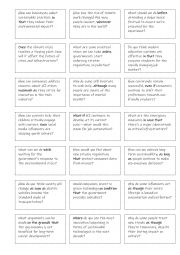
|
B2-C1 Conjunctions with 42 questions
First, students need to familiarise themselves with the 42 linking words and their meanings. Then in pairs or small groups they discuss the questions.
Level: advanced
Age: 14-100
Type:
Downloads: 119
|
|
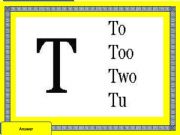
Catchphrase- Rebus -Dingbats
A fun way to remember vocabulary with this animated rebus containing compounds, common phrases, phrasal verbs and nouns. Part 8 of 8
Level: intermediate
Age: 12-100
Downloads: 1752
|
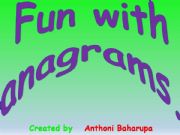
Fun with Anagrams
Students in pairs / groups read the sentence on each of the 20 slides, trying to find out the wrong word. Then rearrange the wrong word to make a more logical sentence. An example is shown on the 2nd slide. Good for a warmer or cooler too. Part 1 of 2
Level: intermediate
Age: 12-100
Downloads: 4137
|
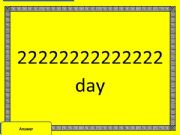
Catchphrase-Rebus -Dingbats
An excellent way to remember vocabulary with this rebus containing compounds, common phrases, phrasal verbs and nouns. Part 5 of 8
Level: intermediate
Age: 12-100
Downloads: 1917
|
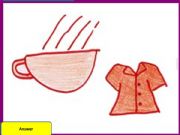
Catchphrase-Rebus-Dingbats
A fun way to remember vocabulary with this rebus containing compounds, common phrases, phrasal verbs and nouns. Part 2 of 8
Level: elementary
Age: 7-16
Downloads: 2008
|
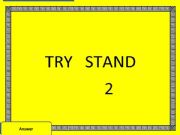
Catchphrase- Dingbats -Rebus
A fun way to remember vocabulary with this rebus containing compounds, common phrases, phrasal verbs and nouns. Part 4 of 8
Level: intermediate
Age: 12-100
Downloads: 1949
|
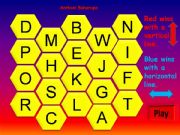
Blockbusters 2
I use this for revision of vocabulary / spelling / dictionary practise or phonetics. 3 slides with increasing levels of difficulty. Last 2 slides have initial consonant clusters. Normally I give each team elementary or advanced dictionaries. When the opposing team selects a letter the other team mem...
Level: intermediate
Age: 11-17
Downloads: 5758
|
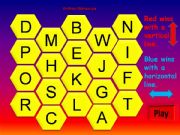
Blockbusters 1
I use this for revision of vocabulary / spelling and dictionary practise. 3 slides with increasing levels of difficulty.
Press the letter once for red
Press the letter twice for blue
Press the letter three times to return to yellow
Level: elementary
Age: 7-16
Downloads: 5883
|
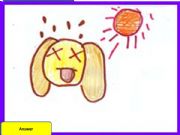
Catchphrase-Rebus-Dingbats
An excellent way to remember vocabulary with this rebus containing compounds, common phrases, phrasal verbs and nouns. Part 1 of 8
Level: elementary
Age: 7-16
Downloads: 2038
|
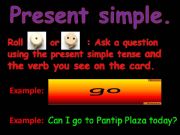
Present Simple
Students select 1-20 (hyperlinked for ease of use) then roll a dice and depending on the number make a positive / negative sentence or ask a question using the verb on the slide. If they are able to make a sentence / question using their meta-language, that student earns points for their t...
Level: elementary
Age: 8-100
Downloads: 2535
|
|
|





















